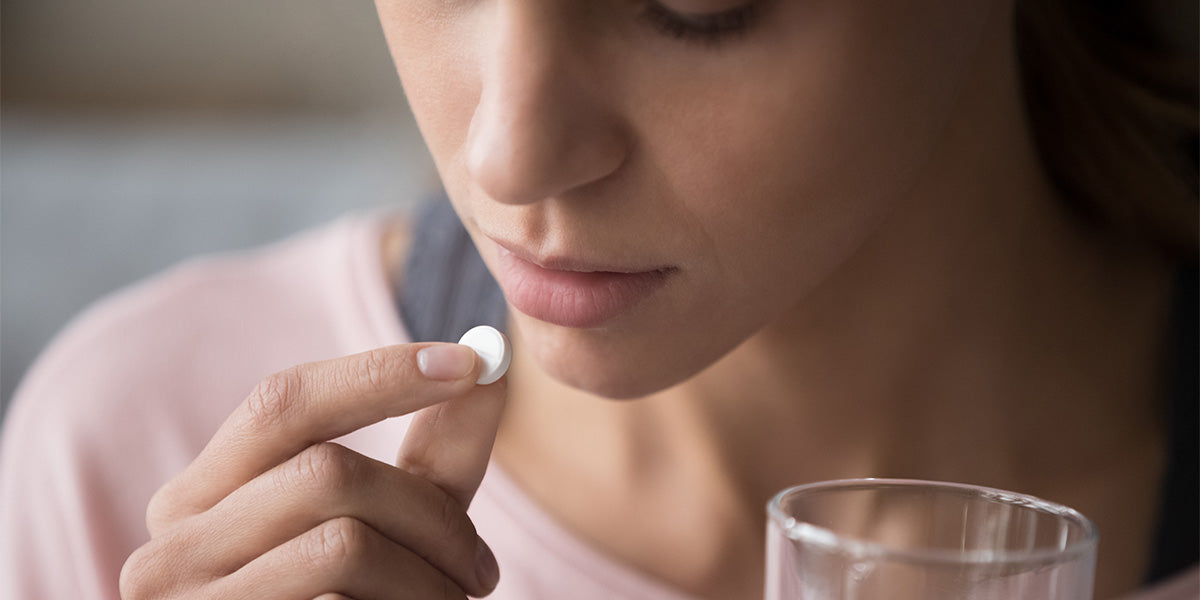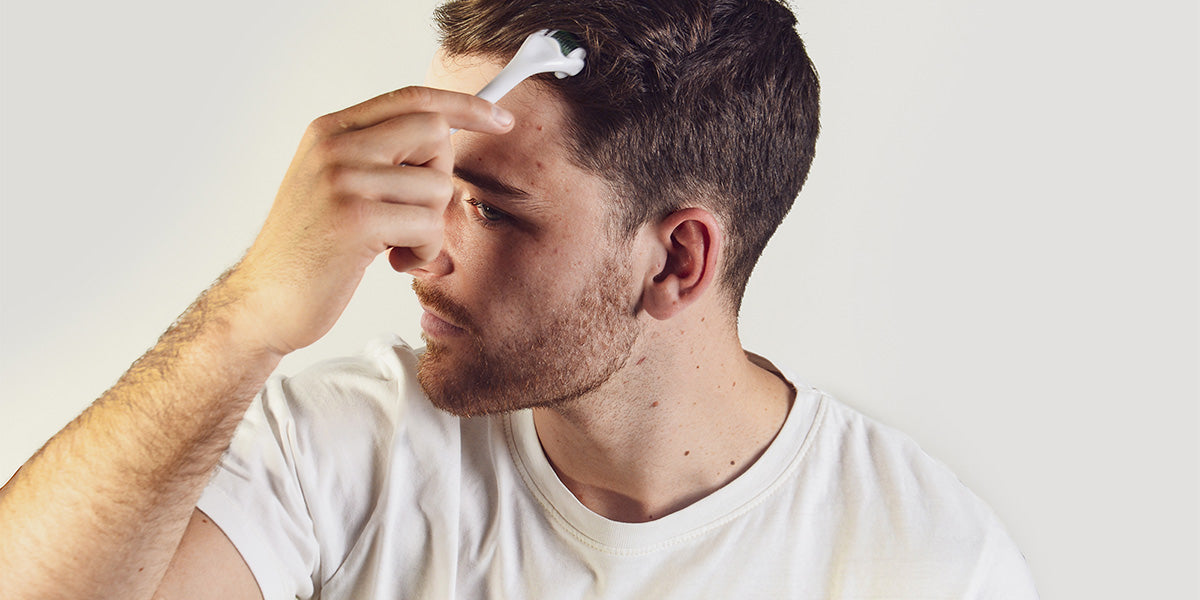With summer fast approaching, you might be wondering whether the long winter months of minimal sun have had an effect on your body and more specifically, your hair. As most people know, the sun is a vital source of vitamin D and our vitamin D levels can take a serious hit during the winter. But what effect does this have on our hair and can vitamin D deficiency cause hair loss?
Let’s take a closer look at the link between vitamin D and hair loss and explain how a vitamin deficiency might impact your hair and what you can do about it.
Is there a link between vitamin D and hair loss?
Vitamin D is mostly known for its essential role in bone health, but it also plays a key role in regulating other processes in the body, such as:
- Supporting a good immune system
- Muscle functioning
- Brain cell activity
But what about its role in hair growth? Well, vitamin D is believed to have some involvement in regulating the hair growth cycle and specifically the activity of cells called keratinocytes. These cells are responsible for producing a protein called keratin, which is a structural building block for your hair, skin and nails. Vitamin D is metabolized by keratinocytes in the skin (Bikle, 2011), which essentially means that it’s processed into a form that is useful for the body. When there’s a lack of vitamin D (as in the case of a vitamin D deficiency), it may impact the way keratinocytes work (Xie et al, 2002), which can disrupt various biological pathways, including those responsible for the growth of hair.


Get To The Root Of Your Hair Loss
XYON hair specialists will evaluate your hair loss so you get the right solution.
Does vitamin D deficiency cause hair loss?
Hair loss is a complex, often multifactorial condition, so the answer to this question isn’t as simple as you might think. Whilst you aren’t guaranteed to experience hair loss with a vitamin D deficiency, it may be a risk factor.
Like many of the intricacies relating to hair growth and hair loss, we don’t have a complete understanding of vitamin D’s role in the hair growth cycle, but the preliminary research has suggested that it has some involvement in our hair cycle. The role of vitamin D in the hair cycle was first suggested when hair loss was observed amongst those suffering from vitamin-D dependent rickets (a condition caused by the body’s inability to maintain or respond to adequate levels of vitamin D) (Brooks et al, 1978).
Since then, vitamin D deficiency has been linked to several types of non-scarring alopecia (hair loss). Notably, one study found that the prevalence of vitamin D deficiency was significantly higher amongst participants with alopecia areata, an autoimmune hair loss condition, compared to healthy participants (Cerman et al, 2014). Interestingly, the severity of disease seemed to be directly correlated with lower levels of vitamin D.
Can vitamin D supplementation help with hair loss?
If your hair loss coincides with a vitamin D deficiency, then increasing your intake through sunlight, diet or supplements may help with your hair loss. But true vitamin D deficiencies are rare and there are many other possible reasons why you may be losing your hair and in these cases, vitamin D may not be beneficial.
Having said that, vitamin D is likely still an important substance when it comes to overall hair health. It is believed that it interacts directly with the hair follicles, helping regulate healthy hair growth and interacting with the hair cycle by promoting the initiation of the active growth stage (known as the anagen phase) (Demay et al, 2007).
For hair growth, vitamin D has been implicated as an important substance, particularly in cases where the hair follicles are under stress due to illness etc. Supplementing vitamin D may be helpful for patients with chemotherapy-induced hair loss. A study using a topical ointment containing a form of vitamin D on mice, found it to be effective at protecting hair follicles from some types of chemotherapy (Chen et al, 1998). It also promoted healthy regrowth of hair following chemo treatments (Paus et al, 1996). Although these findings are exciting, it’s worth noting that the usefulness of vitamin D supplementation in treating human hair loss hasn’t been fully established and further research is needed to gain a better understanding of the underlying protective mechanisms.
How can you increase your vitamin D levels?
The only way to accurately determine your vitamin D levels is by talking to your doctor and getting a blood test. If you’re worried about your vitamin D and hair loss, we recommend speaking to your healthcare provider. But in the meantime, here are some ways to help you increase your vitamin D intake:
- Eating more fatty fish, seafood and egg yolks can be a good way of incorporating more vitamin D into your diet
- Many dairy products are fortified with vitamin D and can also be a good source
- Mushrooms are a good natural source of vitamin D if you follow a vegan diet
- Take a vitamin D supplement – make sure you talk to your doctor first to ensure you’re taking the right amount
- Increase your time in sunlight if possible
If you know that you have pattern hair loss, minoxidil might be a beneficial treatment option for you. At XYON, we offer an oral minoxidil tablet which also includes vitamin D and it can be prescribed following a consultation with one of our hair loss specialists. The addition of vitamin D helps to support healthy development of hair cells and addresses any potential deficiencies that may be associated with your hair loss.
Can you have too much vitamin D?
Vitamin D toxicity is very rare, but it can happen. This will usually happen from taking too much in supplements and is very unlikely to occur from diet or sunlight. The main impact of taking too much vitamin D is a buildup of calcium in the body, known as hypercalcemia. This can cause symptoms such as nausea, vomiting and more frequent urination. If left untreated, this can progress to organ damage, such as damage to the kidneys.
It is important to talk to your doctor before starting a vitamin D supplement to ensure you are taking the right dose for your age and sex. If you’re thinking about taking vitamin D for hair loss, we strongly advise you talk to a medical professional first. Hair loss is complex and whilst vitamin D deficiency might affect your hair, it’s possible that there are other factors at play that might require more targeted treatments.
Takeaway: vitamin D and hair loss
Vitamin D is a vital nutrient in our body and it can be important for maintaining overall healthy hair. Helping to regenerate hair follicles and support the development of proteins and cells in the scalp, your hair growth may be affected if you aren’t getting adequate vitamin D intake. Having said that, vitamin D is unlikely to be the sole reason for your hair loss and there are probably other factors at play. Consider speaking to a medical professional to get the appropriate treatment that targets the root cause of your hair loss. But in the meantime, getting moderate sun exposure and including more foods rich in vitamin D in your diet may be helpful.
References
Bikle, D.D. (2011). Vitamin D metabolism and function in the skin. Molecular and cellular Endocrinology, 347(1-2), 80-90. https://doi.org/10.1016/j.mce.2011.05.017
Brooks, M.H., Bell, N.H., Love, L., Stern, P.H., Orfei, E., Queener, S.F., Hamstra, A.J., DeLuca, H.F. (1978). Vitamin-D-dependent rickets type II. Resistance of taget organs to 1,25-dihydroxyvitamin D. New England Journal of Medicine, (18), 996-999. https://doi.org/10.1056/nejm197805042981804
Cerman, A.A., Solak, S.S., Altunay, I.K. (2014). Vitamin D deficiency in alopecia areata. British Journal of Dermatology, 170(6), 1299-1304. https://doi.org/10.1111/bjd.12980
Chen, G., Baechle, A., Nevins, T.D., Oh, S., Harmon, C., Stacey, D.W. (1988). Protection against cyclophosphamide-induced alopecia and inhibition of mammary tumor growth by topical 1,25-droxyvitamin D3 in mice. International Journal of Cancer, 75(2), 303-309. https://doi.org/10.1002/(sici)1097-0215(19980119)75:2%3C303::aid-ijc21%3E3.0.co;2-c
Demay, M.B., MacDonald, P.N., Skorija, K., Dowd, D.R., Cianferrotti, L., Cox, M. (2007). Role of the vitamin D receptor in hair follicle biology. The Journal of Steroid Biochemisty and Molecular Biology, 103(3-5), 344-346. https://doi.org/10.1016%2Fj.jsbmb.2006.12.036
Paus, R., Schilli, M.B., Handjiski, B., Menrad, A., Henz, B.M., Plonka, P. (1996). Topical calcitriol enhances normal hair regrowth but does not prevent chemotherapy-induced alopecia in mice. Cancer Research, 56(19), 4438-43.
Xie, Z., Komuves, L., Yu, Q.C., Elalieh, H., Ng, D.C., Leary, C.L., Chang, S., Crumrine, D., Bikle, D.D., Yoshizawa, T., Kato, S. (2002). Lack of the vitamin D receptor is associated with reduced epidermal differentiation and hair follicle growth. Journal of Investigative Dermatology, 118(1), 11-16. https://doi.org/10.1046/j.1523-1747.2002.01644.x



